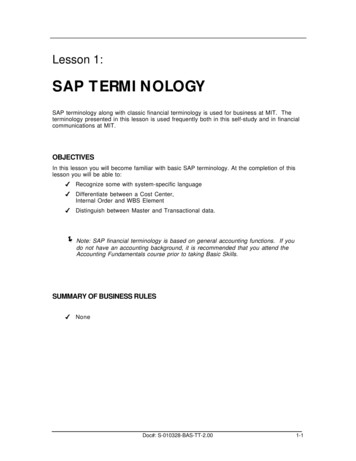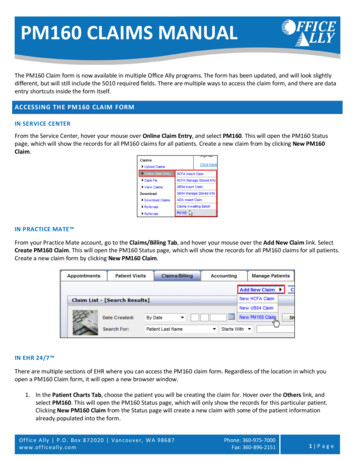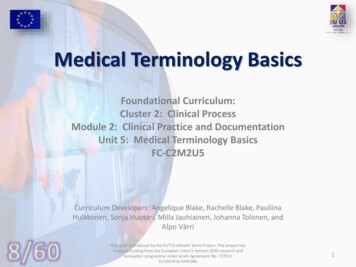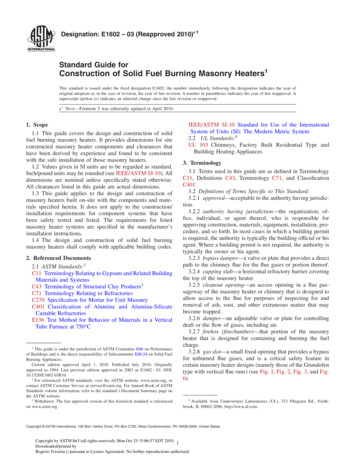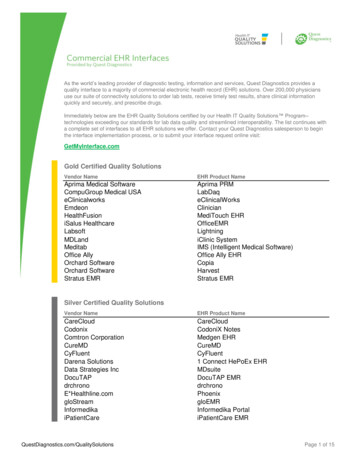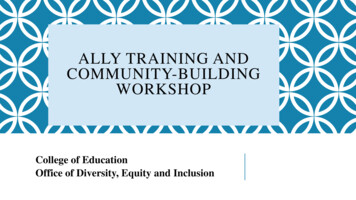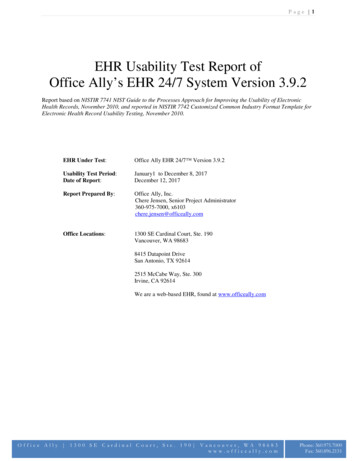
Transcription
AN ALLY’S GUIDE TOTERMINOLOGYTalking About LGBT People & Equality
INTRODUCTIONThe words we use to talk about lesbian, gay, bisexual and transgender (LGBT) people and issues can have a powerful impacton our conversations. The right words can help open people’s hearts and minds, while others can create distance or confusion.For example, the abbreviation “LGBT” is commonly used within the movement for lesbian, gay, bi and transgender equality,but it can be confusing and alienating to people who don’t understand what it means (for many media and mainstreamaudiences, the term gay and transgender is more accessible without being overwhelming).Designed for new allies who want to support LGBT Americans but often face an array of confusing terminology and language,this short guide offers an overview of essential vocabulary, terms to avoid, and a few key messages for talking about variousissues. The Talking About LGBT Issues series, available online at www.lgbtmap.org/talking-about-lgbt-issues-series andwww.glaad.org/talkingabout, provides additional recommendations and resources.GAY, LESBIAN & BITerms to Use gay (adj.) lesbian (n. or adj.) bi (adj.) bisexual (adj., ifneeded on firstreference forclarity) being gayUsage Examples“gay people”“gay man/men”“lesbian couple”Terms to Avoid “homosexual” “gay” (n.) (as in, “Heis a gay.”)“bi men and women”“He is gay.” / ”She is alesbian.” / “He is bi.”“She talked aboutbeing gay.”(on first reference,if needed forclarity)“a person’sorientation”“Sexual orientationcan be a complextopic. A person’sorientation is ” “homosexuality” “lesbianism” “That’s so gay.” (a “sexual preference” “gay lifestyle” “homosexuallifestyle” “same-sexattractions” “sexual identity” gay and transgender lesbian, gay,bisexual andtransgender (ifneeded for clarity) openly gay“laws that protectgay and transgenderpeople”“She is openly lesbian.”/ “He is openly bi.”Gay is an adjective, not a noun; it is sometimes usedas a shorthand term encompassing gay, lesbianand bisexual orientations (though not transgenderpeople or gender identity). Also, while many lesbiansmay identify as gay, the term lesbian(s) is clearerwhen talking only about a woman or women.Anti-gay activists often use words like “homosexual”to stigmatize gay people by reducing their lives topurely sexual terms.hurtful slur) orientation sexual orientationExplanation “LGBT” (when talking with those whoare unfamiliar withthe issues or notyet supportive) “admitted he wasgay”Talking about a person’s “homosexuality” can, insome cases, reduce the life of that person to purelysexual terms. Talk about being gay instead.The term “lesbianism” is considered pejorative.The term “sexual preference” is used by anti-gayactivists to suggest that being gay is a choice, andtherefore can be changed or “cured.” Similarly, theterm “gay lifestyle” is used to stigmatize gay peopleand suggest that their lives should be viewed onlythrough a sexual lens. Just as one would not talkabout a “straight lifestyle,” don’t talk about a “gaylifestyle.”Reference sexual orientation and gender identitywhen talking about issues pertaining to both. (SeeTransgender on the next page for more information.)The abbreviation “LGBT” can be confusing andalienating for those who are unfamiliar with theissues or not yet supportive—though it is essentialwhen talking to LGBT and strongly supportiveaudiences. Use the term that allows your audienceto stay focused on the message without creatingconfusion about your intended meaning.The term “admitted” suggests prior deception or thatbeing gay is shameful.
TRANSGENDERThe term transgender refers to people whose gender identity (the sense of gender that every person feels inside) or genderexpression is different from the sex that was assigned to them at birth. At some point in their lives, transgender peopledecide they must live their lives as the gender they have always known themselves to be, and often transition to living asthat gender.Terms to Use transgender (adj.)Usage Examples“transgender clusion”Terms to Avoid “transgendered” “a transgender” (n.) “transgenders” (n.) “transvestite” “tranny”ExplanationTransgender is an adjective, not a noun. Be carefulnot to call someone “a transgender.” Do not add anunnecessary “-ed” to the term (“transgendered”),which connotes a condition of some kind. Neveruse the term “transvestite” to describe a transgenderperson.The shorthand trans is often used within the LGBTcommunity, but may not be understood by generalaudiences.Always use a transgender person’s chosen name. Also,a person who identifies as a certain gender shouldbe referred to using pronouns consistent with thatgender. When it isn’t possible to ask what pronouna person would prefer, use the pronoun that isconsistent with the person’s appearance and genderexpression. gender identity gender expression“Everyone shouldbe treated fairly,regardless of genderidentity or expression.” “sexual identity”(the correct term isgender identity) “transgender identity” (use genderidentity to refer toa person’s internalsense of gender) transition“She begantransitioning last year.” “sex change” “sex-changeoperation” “pre-operative” /“post-operative” “pre-op” / ”post-op”Not everyone who is transgender identifies thatway; many transgender people simply identify asmale or female. Also, note that gender identity (one’sinternal sense of gender) and gender expression (howa person outwardly expresses their gender) are notinterchangeable terms.Transition is the accurate term that does not fixateon surgeries, which many transgender people donot or cannot undergo. Terms like “pre-op” or “postop” unnecessarily fixate on a person’s anatomy andshould be avoided.
OVERVIEW: TALKING ABOUT EQUALITY FOR LGBT PEOPLEEffective conversations about LGBT issues frame those issues in authentic, emotionally compelling ways that resonate withpeople’s values.When conversations about equality are rooted in the common ground we share, it’s difficult to cast LGBT people as being“other,” “different” or “not like me.” It also makes it more difficult for Americans to ignore or dismiss the harms and injusticesthat LGBT people face.When talking about equality for LGBT people: Use the language of common values, beliefs, hopes and dreams. Make it about people and their stories, not policies. Remind people that LGBT people are everyday Americans who live ordinary lives. Gay and transgender people areneighbors, coworkers and friends who also walk the dog, mow the lawn, shop for groceries, etc.For example: “This is about everyday Americans who want the same chance as everyone else to pursue health and happiness, earna living, be safe in their communities, serve their country, and take care of the ones they love.”For more information, see Talking About LGBT Issues: Overall Approaches, available at www.lgbtmap.org and www.glaad.org.Terms to Use fairly and equally fairness andequalityUsage Examples“Everyone should betreated fairly andequally.”“She supports fairnessand equality.”Terms to AvoidExplanation “rights” “civil rights” “gay rights”“Rights” language is generally unpersuasive withmost audiences, and civil rights comparisons can beespecially alienating to African Americans.Avoid highly charged, argumentative terms like“hate” and “bigotry,” which are likely to alienatepeople. Instead, use language that is measured andrelatable to create empathy and a sense of howrejecting attitudes and actions hurt LGBT people. intolerance rejection exclusion unfairness hurtfulness“This is the kind ofexclusion and intolerance that divides ourcommunity.” “hate” / “haters” /“Rejection by one’sfamily can be the mosthurtful of all.” “prejudice” anti-gay activists far-right activists“the hurtful rhetoric ofanti-gay activists” “religious extremists/“hatred” “bigot” / ”bigots” /“bigotry”extremism” “anti-gay Christians”Avoid language that unfairly paints an entirereligious tradition or denomination as being antigay or extremist.
TALKING ABOUT MARRIAGE FOR SAME-SEX COUPLESIn conversations about marriage for same-sex couples, it is important to: Focus on the values of marriage and what marriage is about: loving, committed couples who want to make a lifelongpromise to take care of and be responsible for each other, for better and for worse. Help people understand and grapple with how same-sex couples are hurt when they are shut out of marriage—andhelp people think about how they would feel if someone told them that they couldn’t marry the person they love. Remind people of how our shared beliefs—particularly in the Golden Rule, freedom, and not sitting in judgment ofothers—are at the heart of people’s journeys toward supporting marriage. Don’tbe drawn into debating opponents’ fear-based strategies. Instead, keep the conversation focused on whymarriage matters—to you, and to the people you know and love.For more information, see An Ally’s Guide to Talking About Marriage for Same-Sex Couples, available at www.lgbtmap.org,www.glaad.org and www.freedomtomarry.org.Terms to Use marriage exclusion frommarriage denial of marriageUsage Examples“Denyingsomeonethe chance at happiness that comes withbeing married—justbecause they’re gay—seems hurtful to me.”Terms to Avoid “gay marriage” “same-sex marriage”“I believe in treatingothers the way I wantto be treated. I wouldn’twant anyone to tell methat I couldn’t marrythe person I love--and Idon’t want to do that toanyone else.” love, commitment,responsibility,promise taking care of theone you love“Marriage is aboutloving,committedcouples who wantto make a lifelongpromise to take careof and be responsiblefor each other, in goodtimes and bad.ExplanationGay couples and straight couples want to marry forsimilar reasons, and they seek to join the institutionof marriage as it currently exists. Just as it would beinappropriate to call the marriage of two older adults“elder marriage,” it is inappropriate to call the marriageof a same-sex couple “gay marriage” or “same-sexmarriage.” If additional clarity is needed, use marriagefor same-sex (or gay/gay and lesbian) couples.Also, while the term “marriage equality” can behelpful when talking with those who are supportiveof marriage for same-sex couples, it can createconfusion and barriers to understanding for otheraudiences. When possible, simply talk aboutmarriage, without modifiers. “marriage rights” “marriage benefits”There is sometimes a misperception that gay couplesonly marry for “rights” and “benefits.” To avoidthis, focus on the values of love, commitment andresponsibility that gay couples bring to marriage,and the importance of a couple being able to takecare of and be there for each other.Also, focus on how gay and straight couples alikeshare similar hopes and dreams for marriage. Butinstead of taking shortcuts by using phrases like“exactly the same” or “just the same,” spend timeexploring the common ground and values (likecommitment, responsibility and love) that we share.Note: These approaches for talking about marriage can also be helpful in talking about other forms of relationship recognition, such asdomestic partnerships or civil unions. However, note that in many states that allow domestic partnerships, same-sex couples have beenbarred from a dying partner’s bedside and denied the ability to say goodbye to the person they love. That just doesn’t happen when acouple is married, and it’s one of the reasons why marriage matters to gay and straight couples alike.
TALKING ABOUT NON-DISCRIMINATION LAWSWhen talking about non-discrimination laws that protect LGBT people from being unjustly fired from their jobs, remindpeople of our common, shared values: Fair and equal treatment, for everyone (“All residents should be treated fairly and equally by the laws of our city/state.”) The importance of hard work and the chance to earn a living (“All hardworking people in our city/state, including gay andtransgender people, should have the chance to earn a living and provide for themselves and their families. Nobody should haveto live in fear that they can be legally fired for reasons that have nothing to do with their job performance.”)For more information, see Talking About Inclusive Employment Protections and Talking About Transgender-Inclusive NonDiscrimination Laws, available at www.lgbtmap.org and www.glaad.org.Terms to Use employment/workplace/housingprotections treating peoplefairly and equallyUsage ExamplesTerms to Avoid“This law protects highperformingworkersfrom being unfairlyfired just becausethey’re gay or transgender.” “rights” “employment/“All residents of ourstate should be treatedfairly and equally.” “fightinghousing rights”discrimination”ExplanationTalking about “rights” in this context can makepeople think about opponents’ false claims about“special rights.” It can also make people resistant tothe idea of non-discrimination protections.There is a difference between referring to nondiscrimination laws (a term that accurately describesthese kinds of laws) and talking about “fightingdiscrimination,” which is generally unpersuasive andcan lead to polarized, partisan reactions.TALKING ABOUT OPEN MILITARY SERVICEWhen talking about open military service: Focus on how open military service—and ending the Don’t Ask, Don’t Tell ban—supports a strong national defense. Talk about the shared values that open military service—and military service itself—embodies.For the latest updates on the repeal of Don’t Ask, Don’t Tell, visit Servicemembers Legal Defense Network (www.sldn.org).For more information, see Talking About Ending Don’t Ask, Don’t Tell, available at www.lgbtmap.org and www.glaad.org.Terms to Use open militaryservice (or openservice) gay (or gay andlesbian) servicemembers/troops/personnel service, duty,courage, sacrifice,patriotism, honor,integrityUsage ExamplesTerms to Avoid“Strong majorities ofAmericanssupportopen military servicefor gay and lesbianpersonnel.” “gays in the military” “soldiers” (when“Open military serviceis about serving one’scountry with honorand integrity.” “rights” “equality”broadly referring tothe troops)ExplanationThe term “soldiers” applies only to personnel servingin the U.S. Army. Use service members, troops,personnel or military personnel to describe thoseserving throughout our nation’s armed forces.Also, note that Don’t Ask, Don’t Tell and its repeal donot apply to transgender people, who remain barredfrom service by other regulations.In conversations about military service, talk aboutthe ideas and ideals that Americans associate withour nation’s armed forces. Don’t talk about “rights”in conversations about open military service, whichis really about service, duty, courage, sacrifice,patriotism, honor and integrity.
TALKING ABOUT PARENTING & ADOPTIONWhen engaging in conversations about adoption and parenting: Focus on the best interests of children, using the language of everyday family life. Emphasize how caring LGBT parentscan provide children with the love, stability, protection, security and guidance they need to succeed. If talking about a proposed ban on adoption by gay parents, focus on three key points:1. Adoption decisions should be made on a case-by-case basis based on what is in the best interests of the child.2. Experienced child health and social service authorities should make adoption decisions.3. All mainstream child authorities and peer-reviewed research on parenting support adoption by gay parents. Remember that research shows that children of gay parents do just fine. There’s a large and growing body of peerreviewed research that examines outcomes for children raised by gay parents. This research consistently concludes thatbeing raised by gay or lesbian parents has no adverse effects on children, and that kids of gay parents are just as healthyand well-adjusted as other children. Also, nearly every credible authority on child health and social services (including theAmerican Academy of Pediatrics and the Child Welfare League of America) has determined that a person’s orientation hasnothing to do with the ability to be a good parent.For more information, see Talking About Adoption & Gay Parents, available at www.lgbtmap.org and www.glaad.org.Terms to Use adoption by lov-ing, caring parents adoption by gay(or lesbian andgay) parents two moms, twoUsage ExamplesTerms to Avoid“We shouldn’t preventkids in need of foreverhomes from beingadopted by loving,caring parents whohappen to be gay.” “gay adoption” “adoption by gay/“This is about creating safe, stable homesfor children. It’s aboutmaking sure that theyhave the loving, nurturing environmentthat allows them tothrive and succeed.” “rights” “adoption rights”same-sex couples”ExplanationAlways keep the focus on loving, caring parents.Talking about parents rather than “couples” helpsemphasize what adoption means to kids—thechance to find a forever home with loving parents.dadsThis is about: the best interestsof children taking care ofand providing forchildren providing childrenParenting and adoption are about providing security,love and protection for kids. Discussions aboutparenting and adoption should not focus on “rights”—but rather on how loving, caring LGBT parents canprovide children with the love, stability, protection,security and guidance they need to thrive andsucceed.with love, security,stability, and loving, forever homes making adoptiondecisions on acase-by-case basisbased on the bestinterests of thechildABOUT THIS SERIESThis is one in a series of documents on effectively talking about LGBT issues, also including: Overall Approaches, Inclusive Employment Protections, InclusiveHate Crimes Laws, Adoption & Gay Parents, Suicide & LGBT Populations, Ending Don’t Ask, Don’t Tell, Talking About LGBT Equality with African Americans,Talking About LGBT Equality with Latinos, an Ally’s Guide to Talking About Marriage, and an Ally’s Guide to Talking About Transgender-Inclusive Non-DiscriminationLaws. For downloadable versions, visit www.lgbtmap.org/talking-about-lgbt-issues-series or www.glaad.org/talkingabout. 2012 Movement Advancement Project (MAP).
2215 Market St. Denver, CO 80205720-274-3263www.lgbtmap.org104 West 29th Street, 4th FloorNew York, NY 10001212-629-3322www.glaad.org
love, commitment, responsibility, promise taking care of the one you love “Marriage is about loving, committed couples who want to make a lifelong promise to take care of and be responsible for each other, in good times and bad. “marriage rights” “marriage benefits” There is so
